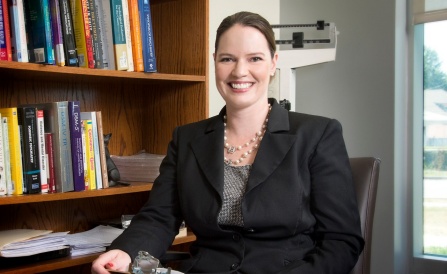Message from the Program Director

“Our training will prepare you to be a better clinician and provide opinions that are appreciated and respected by non-medical professionals,” says Ana N. Cervantes, MD.
Using my background and experience, I've designed a fellowship program that provides you with a solid foundation on which to build your career in forensic psychiatry.
As a forensic psychiatry fellow, you’ll find that our faculty will help you acquire skills and knowledge to provide thorough, thoughtful and ethical consultations to clients who seek your expertise.
If you train in our program, you’ll find that I — like every faculty member in our division — use my experience to ensure you receive the best training possible.
Gain Significant Experience in Correctional Settings
Our correctional experience at the Erie County Holding Center and Erie County Correctional Facility — the second largest jail system in New York — will provide you with ample exposure to treatment, evaluation and research issues unique to correctional settings. You will work with other disciplines, such as social work and psychology, to gain in-depth knowledge in areas including treatment planning and psychological testing.
Develop Skills to Provide Consultations
I have fostered numerous relationships with attorneys and regional agencies that frequently seek consultation on challenging and fascinating cases. I have consulted on a number of high-profile criminal and civil cases, both in the local and federal court system, and I’ll guide you in developing skills to provide such consultations.
Take Advantage of Our Connection to the Law School
I’ve fostered a connection with the UB school of law, and as a fellow in our program, you will benefit from the interactions you’ll have with law professors, law students and lawyers throughout your training.
Didactics including mock trial and journal club give you opportunities to discuss legal issues with law scholars. Further, we enable you to audit classes taught by law professors, which will broaden your perspectives and increase your familiarity with the legal system.
Learn to Manage Ethics-Based Challenges
As a psychiatrist working in corrections, you may encounter a variety of ethics-related conflicts that arise in jails or prisons — conflicts that may complicate treatment or your professional opinion. We know the ethics courses you took in medical school and residency likely did not include dilemmas specific to correctional settings, so our training will prepare you to navigate and manage these conflicts.
Further Develop Your Professionalism
We’re committed to ongoing professional development.
During rotations, you may have opportunities to gain leadership experience by teaching residents about the process of conducting forensic evaluations.
You’ll collaborate with professionals from fields within the intersections of psychiatry and the law, including:
- judges
- juvenile detention center staff
- attorneys
- holding center staff
You’ll work alongside faculty members who emphasize compassion, integrity and responsiveness to the needs of evaluees and patients. Our fellowship will heighten your sensitivity to a diverse population of evaluees and patients.
Benefit From Our Advantageous Location
Training in New York state, you’ll have learning experiences that may not be available in other states. For instance, in New York we have opportunities to perform evaluations for civil commitment of sex offenders. Here, you’ll learn about the nuances of conducting these evaluations, adding to your knowledge base. Not all states — and therefore not all fellowships — offer you this learning opportunity.
At UB, we know it’s important for you to feel at home both in and outside of our training program. We’re aware that a program’s location may be just as important to you as its quality of training. That’s why we’re glad to tell you: the city of Buffalo offers affordable living and four-season charm as well as entertainment, sports, culture, diversified cuisine and recreation. The city is also known for its easy commuting and family-friendly living.
We're proud of the balanced and thorough training we offer. Take a look around our website, and feel free to contact me with questions.
Sincerely,
Ana N. Cervantes, MD
Program Director